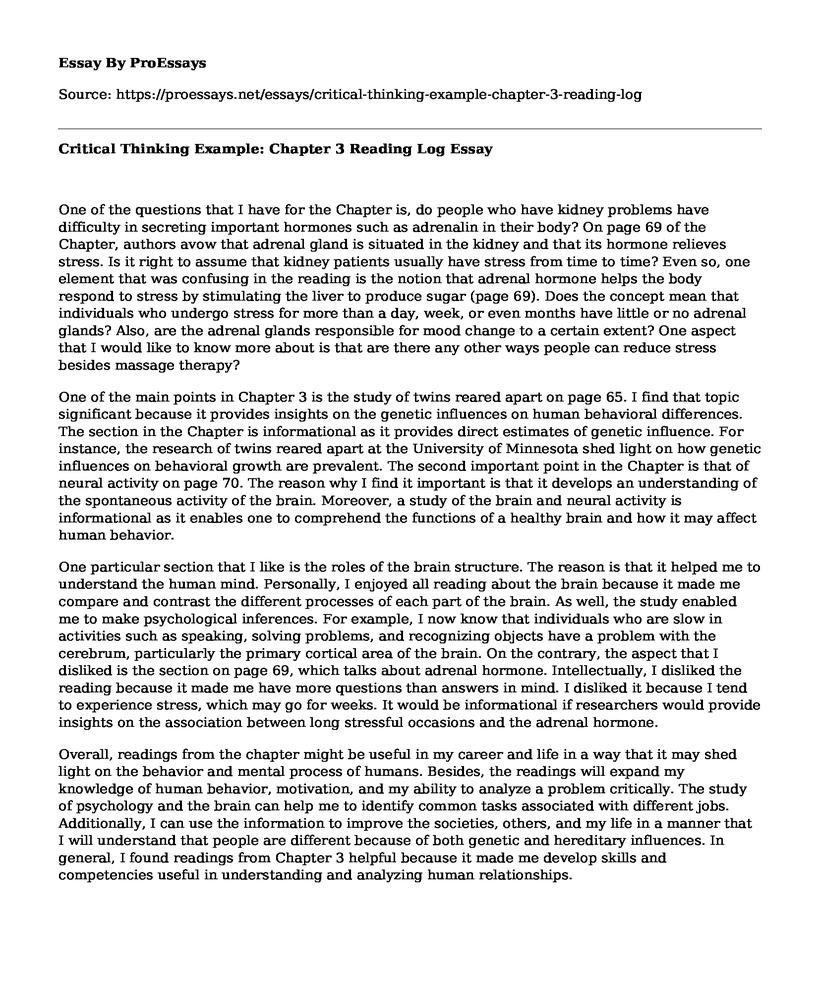One of the questions that I have for the Chapter is, do people who have kidney problems have difficulty in secreting important hormones such as adrenalin in their body? On page 69 of the Chapter, authors avow that adrenal gland is situated in the kidney and that its hormone relieves stress. Is it right to assume that kidney patients usually have stress from time to time? Even so, one element that was confusing in the reading is the notion that adrenal hormone helps the body respond to stress by stimulating the liver to produce sugar (page 69). Does the concept mean that individuals who undergo stress for more than a day, week, or even months have little or no adrenal glands? Also, are the adrenal glands responsible for mood change to a certain extent? One aspect that I would like to know more about is that are there any other ways people can reduce stress besides massage therapy?
One of the main points in Chapter 3 is the study of twins reared apart on page 65. I find that topic significant because it provides insights on the genetic influences on human behavioral differences. The section in the Chapter is informational as it provides direct estimates of genetic influence. For instance, the research of twins reared apart at the University of Minnesota shed light on how genetic influences on behavioral growth are prevalent. The second important point in the Chapter is that of neural activity on page 70. The reason why I find it important is that it develops an understanding of the spontaneous activity of the brain. Moreover, a study of the brain and neural activity is informational as it enables one to comprehend the functions of a healthy brain and how it may affect human behavior.
One particular section that I like is the roles of the brain structure. The reason is that it helped me to understand the human mind. Personally, I enjoyed all reading about the brain because it made me compare and contrast the different processes of each part of the brain. As well, the study enabled me to make psychological inferences. For example, I now know that individuals who are slow in activities such as speaking, solving problems, and recognizing objects have a problem with the cerebrum, particularly the primary cortical area of the brain. On the contrary, the aspect that I disliked is the section on page 69, which talks about adrenal hormone. Intellectually, I disliked the reading because it made me have more questions than answers in mind. I disliked it because I tend to experience stress, which may go for weeks. It would be informational if researchers would provide insights on the association between long stressful occasions and the adrenal hormone.
Overall, readings from the chapter might be useful in my career and life in a way that it may shed light on the behavior and mental process of humans. Besides, the readings will expand my knowledge of human behavior, motivation, and my ability to analyze a problem critically. The study of psychology and the brain can help me to identify common tasks associated with different jobs. Additionally, I can use the information to improve the societies, others, and my life in a manner that I will understand that people are different because of both genetic and hereditary influences. In general, I found readings from Chapter 3 helpful because it made me develop skills and competencies useful in understanding and analyzing human relationships.
Cite this page
Critical Thinking Example: Chapter 3 Reading Log. (2021, Apr 01). Retrieved from https://proessays.net/essays/critical-thinking-example-chapter-3-reading-log
If you are the original author of this essay and no longer wish to have it published on the ProEssays website, please click below to request its removal:
- Call the Midwife and the Role of the Nurse Essay
- Essay Sample on Role of Epidemiology in Public Health
- Essay Sample on Nutrition in Childcare
- Essay Example on Healthy Eating Habits: Conquer Busy Schedules and Eat Right!
- Paper Example on Managing Obesity in Houston, TX: Possible Measures
- SARS: A Deadly and Contagious Respiratory Disease - Research Paper
- My Nursing Journey: Impacting Lives With Compassion - Essay Sample







